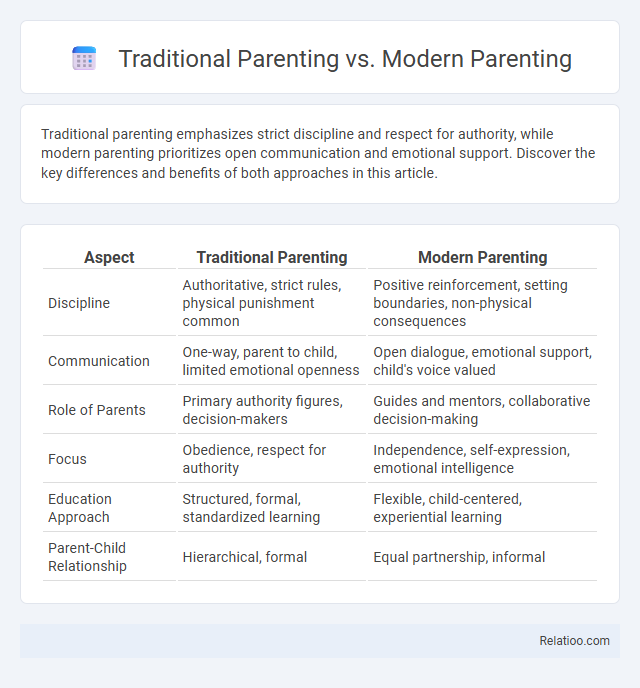Traditional parenting emphasizes strict discipline and respect for authority, while modern parenting prioritizes open communication and emotional support. Discover the key differences and benefits of both approaches in this article.
Table of Comparison
| Aspect | Traditional Parenting | Modern Parenting |
|---|---|---|
| Discipline | Authoritative, strict rules, physical punishment common | Positive reinforcement, setting boundaries, non-physical consequences |
| Communication | One-way, parent to child, limited emotional openness | Open dialogue, emotional support, child's voice valued |
| Role of Parents | Primary authority figures, decision-makers | Guides and mentors, collaborative decision-making |
| Focus | Obedience, respect for authority | Independence, self-expression, emotional intelligence |
| Education Approach | Structured, formal, standardized learning | Flexible, child-centered, experiential learning |
| Parent-Child Relationship | Hierarchical, formal | Equal partnership, informal |
Introduction to Parenting Styles
Parenting styles vary significantly across traditional, modern, and custom approaches, each shaping child development in unique ways. Traditional parenting often emphasizes discipline and respect for authority, while modern parenting focuses on emotional support and open communication. Custom parenting blends elements from both, adapting strategies to fit individual family values and cultural contexts.
Defining Traditional Parenting
Traditional parenting emphasizes respect for authority, clear boundaries, and adherence to cultural customs passed down through generations. It often involves structured routines and discipline methods rooted in long-established values. Understanding your family's unique customs can help bridge traditional approaches with modern parenting techniques for balanced child development.
Understanding Modern Parenting
Modern parenting emphasizes emotional intelligence, open communication, and flexibility, contrasting with traditional parenting's focus on discipline and obedience. Your approach benefits from integrating contemporary psychological insights that prioritize your child's individuality and mental health. Understanding modern parenting helps create a balanced environment where respect, empathy, and adaptability foster healthy development.
Core Values in Traditional Parenting
Traditional parenting emphasizes core values such as respect for authority, discipline, and strong family bonds, often rooted in cultural or religious traditions that guide behavior and decision-making. This approach prioritizes obedience, responsibility, and the transmission of moral principles across generations. In contrast, modern parenting tends to focus on individuality, open communication, and emotional support, while custom parenting integrates elements from both styles to adapt core values according to specific family needs and societal changes.
Core Values in Modern Parenting
Modern parenting centers on core values such as empathy, open communication, and flexibility, promoting a child's emotional intelligence and independence. Unlike traditional parenting, which often emphasizes discipline and respect for authority, modern approaches encourage mutual understanding and respect between parent and child. Your parenting style can benefit from integrating these core values, fostering a nurturing environment that supports your child's holistic development.
Discipline: Old School vs. New Age
Traditional parenting discipline often relies on strict rules, physical punishment, and obedience to authority, emphasizing respect and conformity. Modern parenting favors positive reinforcement, open communication, and emotional intelligence, promoting autonomy and understanding. Custom parenting blends elements of both approaches, tailoring discipline techniques to cultural values and individual child needs, balancing structure with empathy.
Communication Approaches Compared
Traditional parenting emphasizes respect and obedience through authoritative communication, often relying on clear rules and limited emotional expression. Modern parenting encourages open dialogue, emotional validation, and collaborative problem-solving with children to foster mutual understanding. Your ability to balance these approaches can enhance communication effectiveness by integrating structure with empathy.
Technology’s Influence on Parenting
Technology's influence on parenting has transformed traditional, modern, and custom approaches by introducing digital tools that shape child development and family dynamics. Traditional parenting often relies on established cultural norms and direct communication, while modern parenting embraces tech-based resources such as educational apps and online communities to support learning and decision-making. Your parenting style can blend these approaches through custom strategies that balance screen time with real-world interactions, fostering healthy digital habits and emotional growth.
Effects on Child Development
Traditional parenting, characterized by strict discipline and clear authority, often fosters obedience and respect but may limit children's emotional expression and independence. Modern parenting emphasizes empathy, open communication, and flexibility, promoting self-esteem and critical thinking but can sometimes lead to less structured environments. Custom parenting blends cultural values with contemporary practices, balancing discipline and warmth to support holistic child development through tailored emotional and social growth strategies.
Choosing the Best Approach
Traditional parenting emphasizes discipline, respect for authority, and clear boundaries, providing a structured environment for children's growth. Modern parenting prioritizes emotional intelligence, open communication, and adaptability, fostering independence and creativity in children. Custom parenting integrates elements from both styles, tailoring approaches based on individual child needs and family values to achieve optimal development outcomes.

Infographic: Traditional Parenting vs Modern Parenting
 relatioo.com
relatioo.com